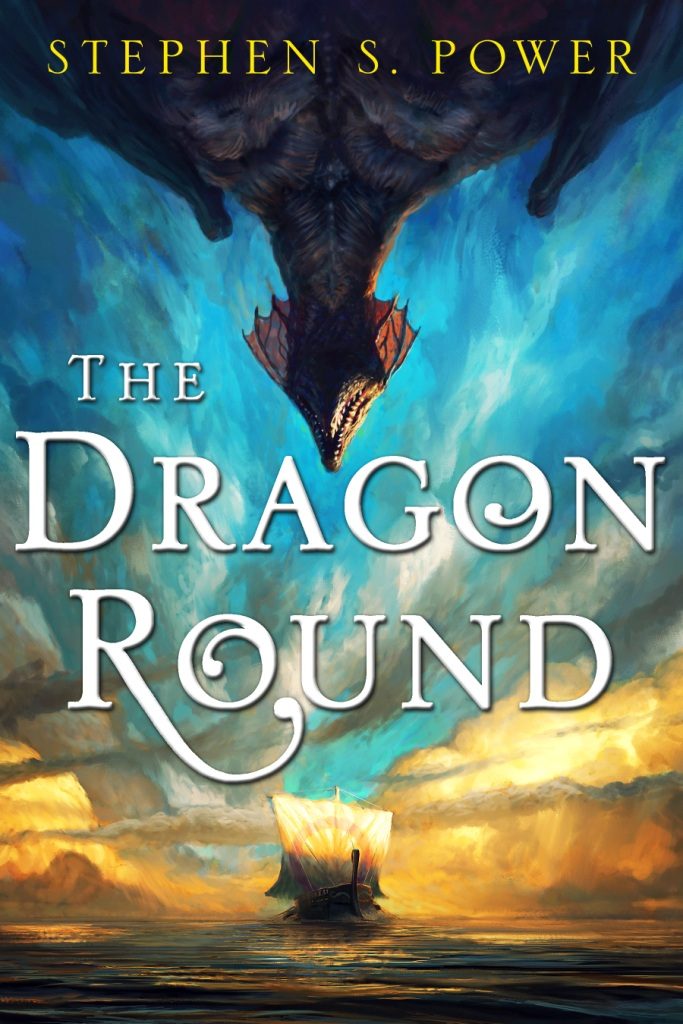By Stephen S. Power: When I researched what it was like to drown, I didn’t expect to one day use that research to save my own life.
In the first chapter of The Dragon Round, two sailors from the trading galley Comber are swept into the sea. Like most sailors during the ages of wooden ships, they can’t swim. Their captain, who can, dives in to save them, but I wanted to know what the sailors would undergo before he could reach them. All I remembered from my junior lifesaving class forty years ago was the possibility that a struggling swimmer might drown a rescuer by trying to use them as a flotation device.
Fortunately, Slate published a great article by Mario Vittone on just this topic, “Drowning Doesn’t Look Like Drowning”. A person in aquatic distress might yell and thrash, and they might be able to assist in their rescue, but this stage doesn’t last long, and once they start to drown they can’t do any of this for several reasons. The one that struck me most was the first: “Except in rare circumstances, drowning people are physiologically unable to call out for help. The respiratory system was designed for breathing. Speech is the secondary or overlaid function. Breathing must be fulfilled before speech occurs.” While I could understand that our reverting to lizard brain instincts in time of peril, I couldn’t fathom not being able to call for help.
Flash forward to Fourth of July last year. My family took a deck boat out on Lake Minnetonka for some cruising, swimming and fishing. As a pre-teen I used to swim across a lake in the Catskills, and I’m in reasonably good shape, so I dove in without thinking, followed by my brother on an inner tube.
What I didn’t realize in my blitheness is that a 10-foot deep, third of a mile-wide, man-made Catskill lake is like a bathtub compared to the wild abyssal sea that is Lake Minnetonka. Nor did I figure that the wind would immediately blow the deck boat far away. I tried to swim for it, but I realized after only a dozen yards that there was no way I could fight the waves and the wind and reach the boat. Also, forty years is a lot of years since I could swim a lake. So I shouted for the boat to come to me, but it wouldn’t start. Then I called for my brother.
While I treaded water, I could feel my chest tightening up, and I was quickly tiring from moving all that lake. That’s when I understood why a drowning person can’t call out. Our lungs act as floatation devices. You don’t want to deflate them the slightest bit, even if you figure you can kick hard, stick your head out of the water and take a replenishing breath–because what if you can’t?
Fortunately, my brother made it to me, tiring himself out. He got me on the inner tube, which he then got on himself, and we concerned ourselves with a new problem: the integrity of the seals on the tube. Eventually the boat reached us, and the summer didn’t end.
What if I hadn’t known what would happen to me during this process? I imagine I wouldn’t have called in time, I would have gone silent and still, and after a few moments my brother would have been left wondering where I’d disappeared to. (Did I mention our mother was on the boat, watching this all play out? Yea.)
Perhaps The Dragon Round will help people too by showing them how to light a fire, prepare crab, row a galley and ride a dragon. I hope it doesn’t need to help them avoid trouble in the water, though, because I’d prefer to hope they don’t get in trouble in the first place.
Stephen S. Power
The Dragon Round
Simon & Schuster
The Dragon Round is the first of a series of at least three novels. I’m currently outlining the sequel, tentatively titled The Dragon Tower. This series, in fact, is the first of several, each of which will cover the major turning point events in human-dragon relations over the ages.
JACKET COPY
For fans of Scott Lynch and Naomi Novik comes a high fantasy epic that blends swashbuckling adventure with a dark tale of vengeance–when a ship captain is stranded on a deserted island by his mutinous crew, he finds a rare dragon egg that just might be the key to his salvation and his revenge.
He only wanted justice. Instead he got revenge.
Jeryon has been the captain of the Comber for over a decade. He knows the rules. He follows the rules. He likes the rules. But not everyone on his ship agrees. When a monstrous dragon attacks the Comber, his surviving crew, vengeful and battle-worn, decide to take the ship for themselves and give Jeryon and his self-righteous apothecary “the captain’s chance:” a small boat with no rudder, no sails, and nothing but the shirts on their backs to survive.
Marooned and fighting for their lives against the elements, Jeryon and his companion discover that the island they’ve landed on isn’t quite as deserted as they originally thought. They find a rare baby dragon that, if trained, just might be their ticket off the island. But as Jeryon and the dragon grow closer, he begins to realize that even if he makes it off the island, his life will never be the same again. In order for justice to be served, he’ll have to take it for himself.
SOCIAL MEDIA
- Website: http://stephenspower.com/novels/
- Facebook: https://www.facebook.com/stephenspower
- Twitter: https://twitter.com/Stephenspower
- GoodReads: https://www.goodreads.com/author/show/13403279.Stephen_S_Power
[Article arranged by Carl Slaughter.]


